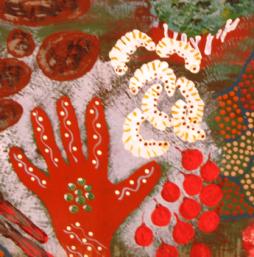Fr Charles Rue wrote "St Francis finds God in Nature" as part of three articles on
Eco-Spirituality and St Francis of Assisi
 As I wrote last week, a Franciscan Sister told me that the best word for her in English to capture the spirit Francis lived by was courtesy. Courtesy was the way Francis related to all God’s creatures, human and nature itself. It was the root of his closeness to God, his spirituality.
As I wrote last week, a Franciscan Sister told me that the best word for her in English to capture the spirit Francis lived by was courtesy. Courtesy was the way Francis related to all God’s creatures, human and nature itself. It was the root of his closeness to God, his spirituality.
An early biographer of the saint relates a story about how Francis was sitting in a boat crossing a river and was given a small water bird to hold. It settled down in his hands as in a nest while he lapsed into prayer. Coming to himself he sweetly told the little bird to return to its original freedom. True to its nature the bird flew away.
Pope John Paul II taught that all parts of creation have their own integrity and this must be respected. Humans often use other people and things purely for their own benefit, without regard to them, reducing them to objects. But they are subjects with the own worth and integrity. Sadly, the Scriptural mission to be steward-masters of creation can be perverted to sanction control, even arbitrary abuse. God calls humans to act like God’s own self, thinking stewards within creation but not separate from it. Two hundred years of human domination of the earth is now being seen in geological terms of change, the Anthropocene. St Francis might say, ‘Enough’.
Scripture helps us cultivate a God-like love for creation. Many Psalms are nature based poems of praise for God – the planets and animals, the elements of frost, snow and wind. St Bonaventure, a disciple of Francis, taught that the Cosmic Revelation is God’s first revelation. Modern science tells of billions of years of cosmic history and faith tells us of salvation history in Jesus continuing in the Holy Spirit as creation evolves. Our history is one, formed from stardust but destined for divinity in the mystery of God.
The Earth Bible Team based in Adelaide explores the suppressed voice of nature in the Scriptures. Their month long Lectionary helps church communities celebrate a ‘Season of Creation’ during September to appreciate anew the integrity of God’s creation, humble in our conscious role within it. We can recall God shouting at Job, Who is this obscuring my designs … were you there when I laid the earth’s foundation … can you guide the morning star …who gave the wild donkey its freedom … does the hawk take flight on your advice? (Ch 38-39)
Pope Benedict XVI says that the theologies of Redemption and Creation must be re-connected as one continuing action of God. Incarnation, God taking on flesh, is key. The world is the primary sacrament, and the Risen Jesus present with a community celebrating the Eucharistic meal is the ultimate sacrament. ‘Matter matters’ says Paul Collins since we find God in our bodily existence on earth. All spirituality and mysticism hinges on this truth.
St Francis identified with his local language and wrote poems in the vernacular of the Assisi region. One can imagine him using the relational language of ecology which explores the ‘inter-connectedness’ of all things and their ‘mutual dependence’. The precise language of science would have excited Francis as would have exploring the wonders of biodiversity. Learning How God Acts, to use the book title of Fr Denis Edwards, would have inspired him.
The world can be a messy place and we need to look not just at the glorious forest tops but at the weeds underneath. Francis invites us to literally get outside into the natural world and wonder and equally invites us to get involved in the hurly-burley of how our society deals with the natural world. He would be on the road to visit reefs, river valleys and remote drylands, finding out about farming, mining and how people gain a living. However, his preaching in these places would always come back to finding the presence of God therein courtesy and our activities tempered by lady poverty as our companion.
Some years ago I wrote for ACSJC on the Attitudes to Nature of Australian Catholics over 200 Years. The entry point of eco-faith pioneers varied. For some it was the endless sky of the western plains. For others, it was the backyard garden plot or animal pets. Some were visionaries like Tenison Wood. The founding advisors to Catholic Earthcare Australia were eco-faith pioneers. From varied backgrounds, they applied their expertise to show God present in the natural world and commit to care in God’s name.
St Francis received the stigmata, the wounds of Jesus appearing in his body. His union with God in Christ was complete. But it is the same Francis who sang with joy about sister moon and brother sun, a man in love with creation.
Published in the Leader Sept-Oct 2012 by Fr Charles Rue SSC.
Related links
- Read more JPIC Articles on St Francis and Ecology

Comments (0)